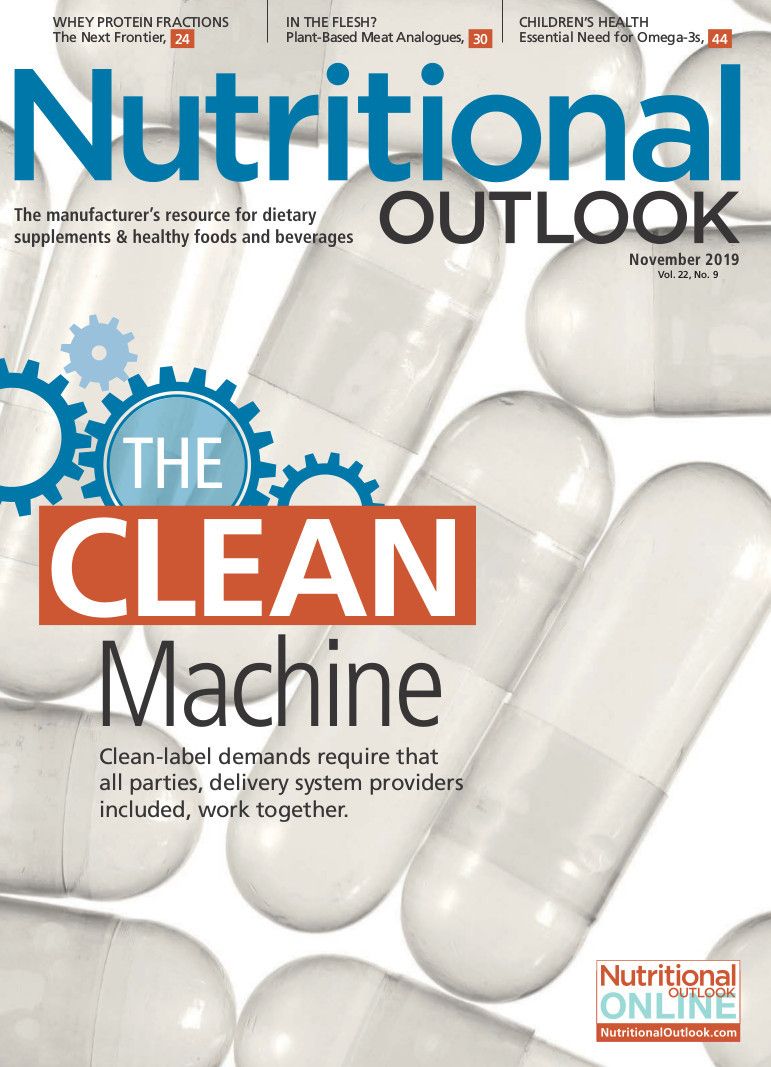Supplements for heart health: ingredient developments and progress, despite some negative omega-3 headlines
Heart health ingredients bring new science and innovation to market, despite some bad press.
Photo © AdobeStock.com/Маргарита Медведева

Cardiovascular disease remains the leading cause of death in the United States. Nearly half of all American adults currently have some form of the disease, according to the American Heart Association (AHA). These include coronary heart disease, heart failure, stroke, and high blood pressure.
When these facts are combined with an American public that is growing ever more eager for information about nutrition and exercise and more aware of product labeling and terminology, the result is a consumer base seeking out and researching dietary supplements for improved cardiovascular health.
Members of the scientific and medical communities, however, have yet to reach consensus on the role of dietary supplements in restoring or maintaining cardiovascular health. The reason for this depends on whom you ask; and, by nature, science, medicine, and nutrition are all dynamic areas of study full of complexity. One recent meta-analysis of supplements for cardiovascular health, “Effects of nutritional supplements and dietary interventions on cardiovascular outcomes: an umbrella review and evidence map,” and an associated editorial, “Dispense with supplements for improving heart outcomes,” both published in the August 2019 issue of the Annals of Internal Medicine, garnered quite a bit of attention and reaction from various cardiovascular-health stakeholders.1,2 The conclusions of the meta-analysis were that reduced salt intake, the use of omega-3 long-chain polyunsaturated fatty acids, and supplementation with folate could reduce the risk of some cardiovascular outcomes in adults. Additionally, “combined calcium plus vitamin D might increase the risk of stroke,” the authors wrote. Limitations of the analysis were “suboptimal quality and certainty of evidence,” they added.
“The piece published in Annals had some positive findings,” says Andrea Wong, PhD, senior vice president, scientific and regulatory affairs, Council for Responsible Nutrition (CRN; Washington, DC). “It showed omega-3 fatty acids can decrease the risk of heart attack and coronary heart disease. Folic acid can decrease the risk of stroke. But these findings were overshadowed by the accompanying editorial, ‘Dispense with supplements for improving heart outcomes,’ which made very broad and unfounded statements on the whole category of supplements and their effect on heart health. And that really does a disservice to consumers as well as to healthcare providers who are advising their patients.”
Wong goes on to make the point that “heart disease is very complex, and many factors can contribute to its development.” She says it is “unrealistic to expect that making one change, like consuming a dietary supplement, will have a dramatic effect on heart health outcomes.” Supplements can play a role in cardiovascular health, she explains, but consumers also need to practice other healthy habits. She adds that supplements can’t be compared to prescription drugs, and that they are “not meant to replace prescription drugs or dialogue with one’s healthcare provider, so it’s unfortunate that the author of the editorial and others are repeating the same [anti-supplements] message and trying to influence public policy in this area.
His is a blanket statement against supplements in general,” she says. “We can’t apply the drug-research paradigm to nutrition research and expect to have the same type of outcome.”
Matthew Roberts, PhD, chief scientific officer at ChromaDex (Los Angeles), which supplies the nicotinamide riboside ingredient Niagen for heart health, including in its own Tru Niagen supplement, shares Wong’s assertion. “Many attacks on supplements are based on a flawed notion that supplements should be studied like drugs. While supplements are a great tool for supporting and promoting health, they are fundamentally different from drugs and should not be seen as a replacement for them.”
He continues, “Drugs are designed to treat diseases-they function in the body to actively improve a condition and/or reverse symptoms of a disease. Supplements, on the other hand, are exactly that: supplements. They supplement the diet to ensure we are giving our bodies the best nutritional support possible. Through nutrition and healthy habits like exercise and good sleep hygiene, we can support the body’s natural ability to function optimally and stay resilient to stress.”
Spotlight on Omega-3s
Omega-3 fatty acids seem to have secured their position among heart-health supplements as one of the leaders. Chris Gearheart, director, member communications and engagement, Global Organization for EPA and DHA Omega-3 (GOED; Salt Lake City), points to three large-scale studies published in the past year-REDUCE-IT3, VITAL4, and ASCEND5-which have “doubled the number of human subjects studied in the literature on omega-3s and cardiovascular outcomes,” he says. And while not all of those studies met their primary research endpoints, he says, they did all show “statistically significant risk reductions in areas like myocardial infarction and coronary heart disease.”
Gearheart explains that there are multiple reasons why some studies show a clear cardiovascular benefit of omega-3s while others do not, including, he says, “the inclusion/exclusion criteria for studies, which are chosen by the authors; the fact that the subjects may be on cardiovascular drugs that are effective, lessening the chance of omega-3s having an additional affect; and, lastly, the lack of baseline level measurement in some studies. If the subjects already have high omega-3 consumption,” he says, “additional omega-3 intake is not as likely to have an impact.” Gearheart adds that GOED is preparing to submit a paper on EPA/DHA and cardiovascular dose response that summarizes the state of the literature in light of this new data, “which we hope to have published this year,” he says.
CRN’s Wong cites a piece published this past September in the Journal of the American Heart Association, “Marine omega-3 supplementation and cardiovascular disease: an updated meta-analysis of 13 randomized controlled trials involving 127 477 participants,” which, she says, further confirms the supplement’s cardio-friendly attributes.6 The meta-analysis concluded that marine omega-3 supplementation “lowers risk for myocardial infarction, coronary heart disease death, total coronary heart disease, cardiovascular disease death, and total cardiovascular disease, even after exclusion of REDUCE-IT. Risk reductions appeared to be linearly related to marine omega-3 dose,” according to the paper’s authors.
Other Heart-Friendly Supplements
While omega-3s’ cardiovascular benefits are largely (if perhaps grudgingly, by some) accepted in the medical community, the variety and volume of other ingredients and supplements with potential for cardiovascular benefits is vast, and study of them is ongoing. What follows is an update on and round-up of some of the most interesting.
Nicotinamide Riboside
“Although scientists first published studies about the molecule nicotinamide riboside (NR) in the 1940s,” says ChromaDex’s Roberts, “its potential to support human health wasn’t uncovered until recently.” And last year, he points out, a study from the University of Colorado Boulder, published in Nature Communications, showed the potential for NR to decrease blood pressure and arterial stiffness.7 “This needs to be replicated,” he says, “but the authors of the study now have two ongoing follow-up clinical trials looking at these cardiovascular endpoints in larger groups of people.” Roberts predicts “lots of exciting research on the horizon” for this ingredient.
Glucosamine
A study published in May of this year in BMJ concluded that glucosamine supplementation in those with osteoarthritis might also be related to lower risk of cardiovascular-disease events.8 In other words, cardiovascular benefits might be a happy side effect.
Jacob Teitelbaum, MD, founder of the “Cures A-Z” app and author of various popular health titles, says that this finding “should not come as a surprise to those who follow the research. Two other large studies with a total of over 330,000 subjects showed similar findings for glucosamine,” he asserts. Teitelbaum is a champion of promoting herbal and other non-pharmaceutical remedies for osteoarthritis pain over the use of NSAIDS, which he says increase the risk of both cardiovascular death and bleeding ulcers. He condones the use of glucosamine and other supplements to treat osteoarthritis pain and laments that marketers of glucosamine can’t cite research findings in support of glucosamine for heart health on their package labels.
D-Ribose
“By introducing D-ribose pre- and post-operation in heart surgery, the extensive damage implicated as reperfusion injury”-tissue damage caused when blood supply returns to tissue following a lack of oxygen-“can be reduced or avoided altogether,” says Michael Crabtree, director of scientific affairs, Bioenergy Life Science Inc. (Minneapolis), which markets the Bioenergy Ribose brand of D-ribose. Supplementation with D-ribose is demonstrated to assist in the maintenance and recovery of the elasticity of left-ventricular function, he adds, preserving stroke-volume-the quantity of blood delivered to tissue with each cycle-by maintaining normal energy charge in cardiac cells.
An “important new discovery” on this front, Crabtree says, is that D-ribose helps untrained individuals to adapt to physical exercise.9 “We have also found that D-ribose combined with caffeine increased energy substance and endurance in fatigued mice, as well as in humans.”10
Indian Gooseberry (Amla) Extract
A study published in January of this year in BMC Complementary and Alternative Medicine indicates a positive effect of Arjuna Natural’s (Kerala, India) Tri-Low full-spectrum botanical amla extract (Phyllanthus emblica) on dyslipidemia, a contributor to atherosclerosis.11 The extract, from a fruit widely used in Ayurvedic medicine, has shown “significant potential in reducing total cholesterol and triglyceride levels and stimulating a more favorable balance of lipid ratios,” according to company literature. The company also states that the extract “is the first of its kind standardized with diglycerides of alpha-linolenic acid and polyphenols.”
Aronia Berry
Harvested from a largely ornamental shrub native to Eastern North America, the aronia berry is rich in polyphenols and is being studied for its potential benefits to cardiovascular health and the microbiome. Eve Landen, media manager, flavor division at Naturex (Avignon, France), part of Givauden (Vernier, Switzerland), points to a recent study published in the American Journal of Clinical Nutrition that suggests that consumption of both aronia whole-fruit powder and extract of aronia berry (Naturex’s Aronox product) improves endothelial function and modulates the composition of gut microbiota, thereby helping to maintain cardiovascular health.12 Aronox comprises Aronia melanocarpa and Aronia mitschurinii.
“Improving endothelial function leads to improvements in blood flow,” Landen says. “A 1% improvement in endothelial function has been shown to correlate with an 8%-12% reduction in CVD risk, according to two recent meta-analyses.”
Part of the Toolbox
Supplements aren’t magic bullets or miracle cures, but they are likely to be one of many useful, valuable tools upon which consumers can call for optimal cardiovascular health, along with proper nutrition, exercise, adequate sleep, and high-quality medical care. Rather than “dispensing with” supplements altogether because the science is still in development, the public and the medical establishment alike might perhaps be wise to keep an open mind, and view supplements the way ChromaDex’s Roberts does: as support for the body’s natural ability to function optimally and stay resilient to stress. “Our toolboxes can include supplements, the type and selection of which will depend on one’s health needs and objectives,” he says.
“Heart disease continues to be the leading cause of death of Americans according to the CDC,” adds CRN’s Wong, “and the prevalence is increasing. It’s a huge burden on quality of life, and on individual and family finances. For these reasons, people seem to be taking a more proactive approach to their health. They may not be waiting for a diagnosis, so there’s a lot of interest among consumers in a nutritional way to maintain their heart health.” Along with other healthy lifestyle habits, supplements-thoughtfully selected and appropriately dosed-may be just the thing.
References:
- Khan SU et al. “Effects of nutritional supplements and dietary interventions on cardiovascular outcomes: an umbrella review and evidence map.” Annals of Internal Medicine, vol. 171, no. 3 (August 2019): 190-198
- Pandey AC and EJ Topol. “Dispense with supplements for improving heart outcomes.” Annals of Internal Medicine, vol. 171, no. 3 (August 2019): 216–217
- Bhatt DL et al. REDUCE-IT Investigators. “Effects of icosapent ethyl on total ischemic events: From REDUCE-IT.” Journal of the American College of Cardiology, vol. 73, no. 22 (June 11, 2019): 2791-2802
- Manson JE et al., VITAL Research Group. “Marine n-3 fatty acids and prevention of cardiovascular disease and cancer.” The New England Journal of Medicine, vol. 380, no. 1 (January 3, 2019): 23-32
- Bavry A et al. “Effects of n-3 fatty acid supplements in diabetes mellitus.” The New England Journal of Medicine, vol. 379, no. 16 (October 18, 2018): 1540-1550
- Hu Y et al. “Marine omega-3 supplementation and cardiovascular disease: an updated meta-analysis of 13 randomized controlled trials involving 127 477 participants.” Journal of the American Heart Association, vol. 8, no. 19 (October 2019). Published online September 30, 2019.
- Martens CR et al. “Chronic nicotinamide riboside supplementation is well-tolerated and elevates NAD+ in healthy middle-aged and older adults.” Nature Communications, vol. 9, no. 1 (March 2018): 1286
- Ma H et al. “Association of habitual glucosamine use with risk of cardiovascular disease: prospective study in UK Biobank.” BMJ. Published online May 14, 2019.
- Seifert JG et al. “The influence of D-ribose ingestion and fitness level on performance and recovery.” Journal of the International Society of Sports Nutrition. Published online December 20, 2017.
- Ding Y et al. “Effects of D-ribose on high-energy phosphate metabolism of skeletal muscle tissues of tired mice.” World Science and Technology-Modernization of Traditional Chinese Medicine. (September 2013): 1916-1920
- Upadya H et al. “A randomized, double blind, placebo controlled, multicenter clinical trial to assess the efficacy and safety of Emblica officinalis extract in patients with dyslipidemia.” BMC Complementary and Alternative Medicine, vol. 19, no. 1 (January 2019): 27
- Istas G et al. “Effects of aronia berry (poly)phenols on vascular function and gut microbiota: a double-blind randomized controlled trial in adult men.” American Journal of Clinical Nutrition, vol. 110, no. 2 (August 1, 2019): 316-329

















